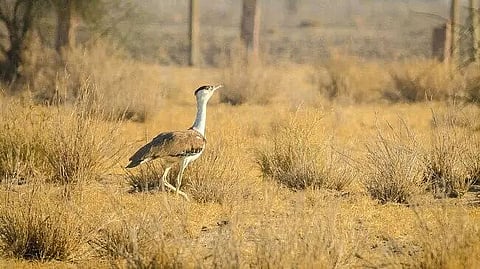
- Home
- Live Blog
- Breaking News
- Top Headlines
- Cities
- NE News
- Sentinel Media
- Sports
- Education
- Jobs

NEW DELHI: The Great Indian Bustard (GIB) or Great Indian Bast*** this was the main concern of the Indian delegation that was participating in the XIIth conference of the 'International Council for Bird Preservation' meeting in Tokyo in May 1960, where the idea was born that each country should designate its own 'national bird'.
Our politically correct babus were petrified that people would mispronounce the Bustard's name as Bast***. And the poor bird lost its first battle.
Legendary ornithologist Salim Ali had recommended Great Indian Bustard (ArdeotisNigriceps) as the 'national bird' of India. "The purpose was to pinpoint public interest and attention to some particular species that stood in the greatest need of protection in each country, especially where it was threatened with extinction owing to public apathy or direct human persecution. The Great Indian Bustard is a species that merits this distinction. This Bustard is a large and spectacular bird, indigenous to India, whose numbers, in spite of the legislative ban on its killing, are dwindling at an alarming rate due to poaching by vandalistic gunners and also encroachment upon its natural habitats. It needs an urgent nation-wide effort to save the bird from its impending doom," appealed Ali.
Unfortunately, Ali's warning went unheeded and India chose the beautiful peacock as the National Bird in 1962 and the GIB lost to its more colourful cousin because of its name. Despite the Bird Man, Salim Ali's, several appeals, nothing was done. In India, the bird was historically found in Punjab, Haryana, Uttar Pradesh, Madhya Pradesh, Chhattisgarh, Odisha, Andhra Pradesh, Rajasthan, Gujarat, Maharashtra, Karnataka and Tamil Nadu. Today it is restricted to isolated pockets of Gujarat and Rajasthan (shared with Pakistan). In 1969, the population of this bird was 1,260 adults. And now? It's about 150 and its presence restricted to the Kutch of Gujarat and Desert National Park in Jaisalmer, Rajasthan.
In February, the UN wildlife conference had accepted India's proposals to include the Great Indian Bustard, the Asian elephant, and the Bengal florican in a list of migratory species targeted for enhanced transboundary conservation efforts.
This was the time for me to meet GIB. A chance to click the endangered bird. Together with veteran wildlife photographer and guide Kamal Sahansi, we reached Sum, about 40 km from Jaisalmer in search of the GIB. To our dismay, we found that the Desert National Park (DNP) was closed indefinitely for the public. Reason, the authorities were still searching and collecting eggs of GIB scattered in DNP under the Species Recovery Programme. Conservationists hope the GIB chicks will eventually become fully grown adults and survive in the wild.
We were now forced to take another route to catch a glimpse of the great bird. Our effort yielded success. After a two-hour bumpy drive through unmarked roads in the Thardesert and scrubs, we decided to disembark and climb the nearby dunes on foot. After the third dune had been climbed, we got the glimpse of four majestic GIB's in an open field. They stood out for their proud gait, long white fur necks and blackish crowns. And there also were chinkaras (Indian Gazelle) around. It was sheer luck to watch Rajasthan's state bird and animal together in single visual sweep.
GIB is the heaviest flying bird in the world. An omnivore, it is a friend of farmers as it loves eating insects. Locals call them 'Godawan'. The GIB is a magnificent bird with males sometimes as tall as 5 feet and weighing 15-17 kilos. The GIB is a k-selected species, which in layman's terms means a species that invests significant energy in one offspring at a time, and has a relatively long life span. They can live for up to 40 years, and females produce one chick a year. (IANS)
Also Watch: GMCH Superintendent: No Shortage of Beds at GMCH